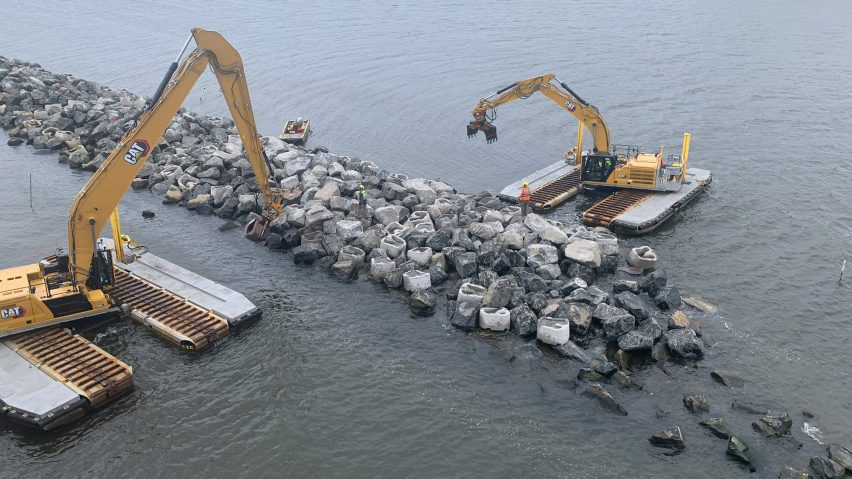Landscape studio Scape has won the Obel Award for 2023 for its "visionary" coastal defence system in New York City that will grow in efficiency as oysters inhabit it.
Named Living Breakwaters, the project was designed by Scape to reduce flood risk and boost ecology along Staten Island, serving as an alternative to traditional coastal barriers.
It is the fifth winner of the Obel Award, which celebrates architectural contributions to people and the planet. This year's theme is adaptation.
Living Breakwaters is a linear stretch of stone and concrete structures currently under construction in Staten Island, aiming to help calm the water and reduce coastal erosion.
However, these structures are also "ecologically enhanced", meaning they incorporate ridges and grooves that encourage marine wildlife to inhabit them and form an artificial reef spanning 223 square metres.
The main species it aims to attract is oysters, which will help the system grow denser as they reproduce and, in turn, improve its effectiveness as a defence barrier.
"The physical design of Living Breakwaters is an ingenious mix of natural and carefully modelled artificial elements that mimic naturally occurring reef formations in order to support marine life," read the Obel Award citation.
"Architecture must recognise its ecological and social responsibilities. Living Breakwaters does exactly that. As such, this relatively low-cost, low-tech response provides a seminal example of how to design not against but with nature in adapting to the changes that lie ahead."
Scape founder Kate Orff said that winning the prize "is really important for a project like this" as it serves as an encouragement for people to contribute and develop coastal adaptation projects.
She said it also serves as a reminder of the importance of designing for the planet as it grapples with the twin crises of climate breakdown and biodiversity loss.
"Our protective natural systems are in various stages of decline globally, and in order to repair them, we have to think and design systemically to tie the pieces back together," said Orff.
"And that is an incredibly bold, creative act. Hopefully, this award can emphasise this point: that nature is a matter of design now and that we have to work fast and work together."
Living Breakwaters was initially developed by Scape for Rebuild by Design – a competition held by the US Department of Housing and Urban Development in the wake of Hurricane Sandy.
Alongside the breakwaters, the project has involved nearly a decade of educational programmes to encourage community stewardship and recreation along Staten Island. The project is scheduled to be completed in 2024.
American landscape architect Martha Schwartz, who served as chair of this year's Obel Award jury, hailed Living Breakwaters as "visionary".
"[It] will not only protect humans and revitalise the coastline of New York City but also restore lost marine biodiversity," Schwartz explained.
"This is a visionary project that tackles the full task of adaptation, and which has the capacity to inspire and to positively impact vulnerable shorelines worldwide."
Scape will receive its Obel Award at a ceremony at the Sydney Opera House on 21 October 2023. The prize is €100,000 as well as a trophy made by artist Tomás Saraceno.
Previous winners have included scientist Carlos Moreno for his urban strategy the 15-Minute City and British company Seratech for its carbon-neutral concrete prototype.
The photography is by Scape.

